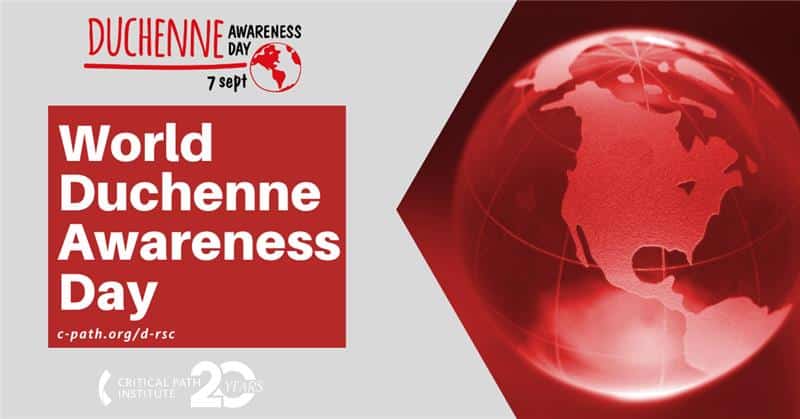
Today is the World Duchenne Awareness Day (WDAD), an annual event that raises global awareness and understanding of Duchenne muscular dystrophy, a rare and progressive genetic disease that causes muscle degeneration.
In celebration of the WDAD, we are excited to recognize and share more about the long-lasting commitment, drive, and determination displayed by the founders and members of C-Path’s Duchenne Regulatory Science Consortium (D-RSC), a public private partnership co-founded by patients advocates, to advance drug development in DMD and other dystrophinopathies.
Ten years ago, Critical Path Institute (C-Path) and Parent Project Muscular Dystrophy (PPMD) set out on a bold mission: To support collaborative research through shared data access that advances drug development in Duchenne Muscular Dystrophy (DMD). That vision led to the creation of C-Path’s Duchenne Regulatory Science Consortium (D-RSC).
Today, after a decade of innovation and collaboration, D-RSC has become a global leader in shaping how therapies for Duchenne are researched, tested, and delivered to patients.
Putting Patients at the Center
D-RSC works to ensure that people living with this life-threatening disease are true partners. Duchenne is caused by a genetic mutation in the DMD gene, leading to loss of ambulation and upper limb function, which eventually causes respiratory and cardiac failure. Those living with Duchenne and their families become more than participants in research, but true partners. It’s vital to lean on advocates like Mindy Cameron, Ryan Russell, Adith Thummalapalli, and Colin Werth and to listen to their valuable insight as advisors to the consortium, ensuring the patient perspective is always front and center.
This commitment has made D-RSC more than just a research project — it’s a community-driven effort to ensure therapies are designed with what matters most to people living with this disease and their families
Harnessing the Power of Shared Data
One of D-RSC’s most vital achievements has been the development of a powerful database of more than 26 de-identified clinical datasets contributed by patient organizations, biotech companies, and research institutions.
This shared resource allows scientists to:
- Identify meaningful clinical trial endpoints
- Test the feasibility of new studies
- Develop better disease models and trial simulators
More than 30 organizations have already used the database to better understand how Duchenne progresses, explore new therapies, and even support the use of historical controls to make trials more efficient. The collection of this data is paramount to the success of future treatments.
As Werth has stated, “The more data we have, the better the predictions will be. The continued involvement of D-RSC is great, and we’re getting more of the data that is needed.”
Tools That Transform Clinical Trials
Running a clinical trial in a rare disease like Duchenne is complex — finding enough participants, choosing the right measures, and ensuring meaningful results is never easy. That’s why, in March of 2024, D-RSC launched a clinical trial simulation tool that helps researchers design smarter, more efficient studies.
This tool models changes in key measures such as walking, stair-climbing, breathing capacity, and motor function over time, taking into account variables like age, steroid use, and genetic mutation. With it, researchers can predict outcomes more accurately, optimize trial size, and better measure the impact of potential therapies.
The European Medicines Agency (EMA) has even issued a Letter of Support, recognizing its potential to improve how Duchenne trials are designed and conducted.
A Decade of Milestones
Over the past 10 years, D-RSC has achieved many incredible milestones, including:
- Publishing the first Therapeutic Area User Guide for Duchenne and a cardiac imaging supplement to help standardize data worldwide.
- Launching a public-facing database through the Critical Path Open Data Repository.
- Securing regulatory recognition from both the FDA and EMA for new biomarkers and clinical trial tools.
- Releasing its trial simulation platform publicly through the Rare Disease Cures Accelerator-Data and Analytics Platform (RDCA-DAP).
Each step has broken down barriers and paved the way for faster, more patient-focused therapies.
“On World Duchenne Awareness Day, as every day, I feel immense pride in leading D-RSC,” said Ramona Belfiore-Oshan, Executive Director of C-Path’s Duchenne Consortium. “For over a decade, D-RSC has stood alongside the Duchenne community—building trusted collaborations, advancing innovative regulatory science tools, and shaping a path toward better treatments. As we mark our 10-year anniversary, I am deeply honored to continue this mission with our partners, united by a long-lasting commitment to improve the lives of patients and families.”
A Global Community Effort
D-RSC is powered by C-Path’s unique standing as the neutral convener, paving the way for open, pre-competitive collaboration. With this public-private partnership uniting partners from renowned nonprofits, leading hospitals, universities, biotech and pharma innovators, as well as global regulators, the consortium has created a truly international movement to change the future of Duchenne.
And it doesn’t stop with the science. Every year, D-RSC leaders and members share progress at major conferences like the PPMD Annual Conference, CureDuchenne FUTURE, the World Muscle Society Congress, Muscular Dystrophy Association Clinical & Scientific Conference, and C-Path’s Global Impact Conference (CGIC), to ensure discoveries reach the people who need them most.
Looking Ahead
As D-RSC looks to the next decade, the goal is clear: get better treatments to the Duchenne community, faster. That means:
- Sharing more patient data in real time
- Developing and validating novel biomarkers
- Using advanced modeling to improve trial predictions
- Expanding global partnerships
- Keeping patients and families at the heart of every innovation
With more collaboration, more data, and more patient voices, the future of Duchenne research looks brighter than ever.
In just ten years, D-RSC has shown what’s possible when science and community come together. By breaking down silos, building powerful tools, and keeping patients in the driver’s seat, the consortium has helped rewrite the playbook for Duchenne research.
Want to get involved?


